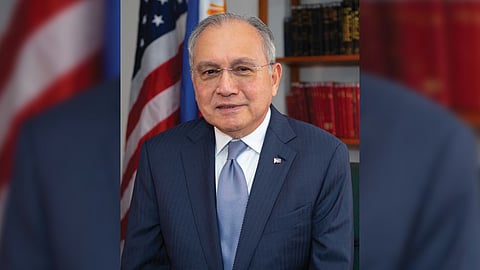
- NEWS
- the EDIT
- COMMENTARY
- BUSINESS
- LIFE
- SHOW
- ACTION
- GLOBAL GOALS
- SNAPS
- DYARYO TIRADA
- MORE

A top envoy of the Department of Foreign Affairs (DFA) on Sunday assured Filipinos that the Philippines has nothing to worry about following the United States’ announced temporary suspension of existing and new foreign assistance.
In a radio interview, Philippine Ambassador to the US Jose Manuel “Babe” Romualdez explained that US President Donald Trump’s directive to freeze foreign aid is part of the US government’s broader effort to reassess its foreign aid policies in line with global priorities.
“There’s nothing to worry about because, in our view, this suspension is simply a measure to review their foreign aid programs to various countries,” Romualdez said in Filipino when asked about potential implications for the Philippines amid China’s continuing aggression in the West Philippine Sea (WPS).
Romualdez emphasized the importance of US military presence in the Indo-Pacific region, particularly through the Enhanced Defense Cooperation Agreement (EDCA) sites in the Philippines. He noted that these sites are critical for maintaining security in the region.
“The aid they’re providing us is not purely financial assistance; it’s tied to military operations, such as the support for our EDCA sites,” he explained.
He also highlighted the benefits of the Mutual Defense Treaty (MDT) between the Philippines and the US, describing it as advantageous to both nations.
“The treaty is mutually beneficial. It ensures the US has a strategic presence in the Indo-Pacific, which aligns with our need for support in addressing issues in the West Philippine Sea. That’s the most significant form of ‘aid’ they’re providing us,” he added.
President Trump recently ordered a 90-day suspension of foreign development assistance to review its efficiency and alignment with his administration’s foreign policy goals.
Following the directive, the US State Department issued a “stop-work” order for all ongoing foreign aid programs and halted new initiatives.
Romualdez reassured the public that the suspension is temporary, citing Trump’s campaign promise to reduce federal spending.
“This is in line with President Trump’s commitment to streamline government spending. They will reassess the programs, but I believe this is only a temporary measure,” he said.
Recent discussions between US Secretary of State Marco Rubio and Philippine Secretary of Foreign Affairs Enrique Manalo are seen as evidence of a strong and continuing alliance between Manila and Washington.
“Our military cooperation will remain intact, and we will continue our shared initiatives. This partnership benefits both countries — it’s not a one-way street,” Romualdez emphasized.
During their dialogue, Rubio and Manalo addressed China’s “dangerous and destabilizing actions” in the South China Sea, which overlaps the WPS.
They also explored ways to enhance security cooperation, expand economic ties, and deepen collaboration in the Indo-Pacific region.
The South China Sea dispute remains a critical issue for the Philippines, with China asserting expansive territorial claims that overlap with the Philippines’ exclusive economic zone in the WPS.
The Philippines won a landmark case at the Permanent Court of Arbitration in 2016, which invalidated China’s claims under international law.
However, Beijing has refused to recognize the ruling and continues to expand its presence in the area, building artificial islands and militarizing key features.
Meanwhile, the US has consistently opposed China’s actions, describing them as a threat to international law and regional stability. It has conducted freedom of navigation operations in the South China Sea and strengthened ties with allies like the Philippines to counterbalance China’s influence.
The US remains a significant donor of international assistance, committing nearly $68 billion in 2023 to 204 countries. The Philippines is among the top recipients, receiving approximately $150 million in official development assistance that year.
Romualdez stressed that the long-standing alliance between the two nations, particularly in military and economic cooperation, would not be undermined by the temporary suspension of foreign aid.
“Our partnership with the US is built on shared values and mutual benefits. This suspension is a momentary phase as they reassess priorities, but it does not diminish the strength of our alliance,” he concluded.
